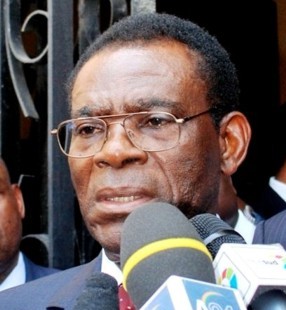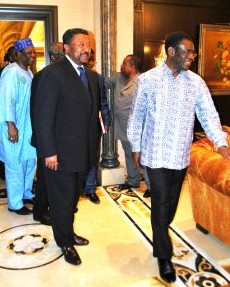|
Africa | Equatorial Guinea Politics | Society Africa's worst dictator becomes AU leader
President Obiang, taking power in Equatorial Guinea from his uncle in 1978 in a coup, has the dubious honour of competing for the title as Africa's worst dictator, only comparable to the Presidents of Eritrea and The Gambia.
Until 2001, there was a special UN Rapporteur following the dire human rights situation in Equatorial Guinea and presenting one shocking report after the other. But at that time President Obiang had started to cash in significant oil revenues, spending much of it to improve his international standing. After a surprise UN vote, the special Rapporteur's mandate was withdrawn. Now making use of expensive US marketing and reputation agencies, President Obiang is now trying to sell in an image of himself as a respected elder African statesman. The US spin-doctors regularly overflow the internet with news of social and democratic progress in Equatorial Guinea. He has had some victories. Together with Gabon, Equatorial Guinea will organise the 2012 CAN African football championship. Last year, the parliament of the Central African block CEEAC was opened in Malabo, the Equatoguinean capital. But not everybody could be bought for Mr Obiang's oil money, it was established last year. The Equatoguinean Dictator wanted to donate some of "his" funds to UNESCO to establish the "Obiang Nguema Mbasogo International Prize for Research." The UN culture agency - also representing the world press - had originally agreed to accept the prize, but massive international pressure, including from Africa, forced UNESCO to drop it. This is the man that now is to represent Africa at a global level. The man to voice the NEPAD initiative (which now should be termed officially dead) in the international community. The man that will be the chief of the African Commission on Human and Peoples' Rights. The man that shall head the AU's fight against corruption. The African Union yesterday completely lost its credibility. By Rainer Chr. Hennig © afrol News - Create an e-mail alert for Africa news - Create an e-mail alert for Equatorial Guinea news - Create an e-mail alert for Politics news - Create an e-mail alert for Society news
On the Afrol News front page now
|
front page
| news
| countries
| archive
| currencies
| news alerts login
| about afrol News
| contact
| advertise
| español
©
afrol News.
Reproducing or buying afrol News' articles.
You can contact us at mail@afrol.com









